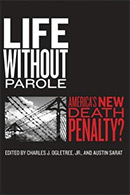Life Without Parole: America’s New Death Penalty?

Authors: Charles J. Ogletree Jr. and Austin Sarat, eds.
Publisher: New York: New York University Press, 2012. 334p.
Reviewer: Leigh Grossman | November 2012
Charles Ogletree Jr. and Austin Sarat are not newcomers to the capital punishment debate. Their previous publications focus on racial disparities in death penalty cases as well as the abolition of the death penalty. Their current edited volume, Life Without Parole: America’s New Death Penalty looks at what death penalty abolitionists have advocated to replace capital punishment, life without parole (LWOP). According to the book, over 41,000 people are serving a sentence of LWOP in the United States. The increased application of these sentences and other similar life sentences has made their review a necessity. The book is split into two parts. The first explores LWOP in connection with the history and modern practice of punishment while the second section examines some of the factors involved in reforming or eliminating LWOP. The authors in this book take a critical look at LWOP, and while they advocate the abolition or reform of the sentence, they are very aware of the considerable challenges they face.
States began to enact LWOP sentencing statutes in light of Furman v Georgia (1972) in order to ensure that those considered the “worst of the worst” were never eligible to be out in public again. Following Gregg v Georgia (1976), prosecutors began to reassess LWOP policies because they gave jurors an alternative to a death sentence that kept offenders behind bars for the rest of their lives. While both LWOP and death sentences usually result in the offender spending the rest of his life in prison, only death cases are eligible for increased legal protections under the ‘death is different’ principle. The authors in the first section of this book believe that LWOP sentences are imposed in a manner similar to pre- Furman death sentences in that they are arbitrary and disproportionately imposed against minorities and the poor. In light of this, the authors argue that LWOP cases should receive the same protections given to death cases.
The authors also pay particular attention to life sentences that are not considered LWOP sentences. Because of the elimination of parole in the federal government and some states, truth in sentencing laws and life sentences that span longer than a prisoner’s natural life, many life sentences are actually LWOP sentences. For Jessica Henry, one of the chapter authors, these sentences are death-in-prison sentences and are degrading and deny human dignity.
Contributors in the second section of the book focus on what they feel needs to be done in order to either reduce the number of LWOP sentences or abolish them. The authors agree that there is not a public outcry against LWOP similar to the outcry against the death penalty. Rather than focus on public sentiment, these authors focus on the courts for reform. The argument is that LWOP sentences for certain crimes violate the proportionality principle of the 8th Amendment. According to the authors, the abolition of LWOP would require the reform of our parole system. The largest obstacle facing parole is that parole boards cannot with certainty determine who will and who will not reoffend and because of this, they release only a limited number of offenders.
Overall, the authors are unable to offer any alternatives to LWOP that can be easily implemented. Change to LWOP requires public support, and at this current point in time, there is no public outcry over LWOP and other life sentences. While the authors’ arguments are valid and strong, without public support, they are unlikely to see change in LWOP sentences any time soon. This book provides a good overview of some of the problems with life sentences, however it only looks at one side of the debate. Readers who are interested in learning more about the alternative side will need to look at other publications.
Leigh Grossman is a Ph.D. student at Rutgers University


